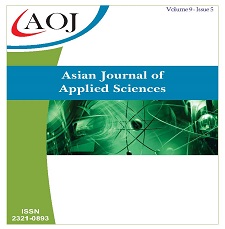Refugee Influx in Ikom Local Government Area of Cross River State: A Sociological Insight into its Impact on Food Security
DOI:
https://doi.org/10.24203/ajas.v9i5.5980Keywords:
refugee influx, Food Security, Ikom Local Government AreaAbstract
The study examines the sudden and unabated influx of refugee exiles from the cameroun into the border town of Ikom and food security within the Local Government Area of Cross River State, Nigeria. In pursued of the study objective, the survey research design was adopted and a sample of 400 respondents was selected from the study population, using the purposive and simple randomization technique from Ikom Local Government area of Cross River State, Nigeria. The instrument used for data collection is a four point likert scale questionnaire structured to accommodate the options of true, completely true, false and completely false. The questionnaire contained 12 items. Data gathered from the field was meticulously while lineal regression was considered appropriate instrument used to analyses the field coded data at 0.05 confidence level. Result revealed that there is a significant relationship between refugee influx and Food Security in Ikom Local Government Area of Cross River State, Nigeria. The study recommends That the Cross River state synergize with the relevant agencies of the Federal Government as well as other international Agencies to stimulate production in ikom through agricultural programmes such as farmers small holders schemes, cassava, banana, yam, plantain plantations schemes, animal husbandry, cottage industries etc. to promote aggressive food revolution within affected areas in order to avert serious food crisis amongst othersReferences
United Nation High Commissioner for Refugees (UNHCR). (2017). Global Trends: Forced Displacement in 2017. UN High Commissioner for Refugees (UNHCR) Annual Reports
IDMC. (2016). Global Overview 2016: People Internally Displaced by Conflict and Violence. Geneva, Switzerland, Norwegian Refugee Council.
United Nations Economic Commission for Africa, African Union and African Development Bank Group (2019). Assessing Regional Integration in Africa: Innovation, Competitiveness and Regional Integration. United Nations publication. Sales No. E.16.II.K.1. Addis Ababa.
Ojong, M. U., Iji, M. E., Angioha, P.U. (2019).Curing Socio-Economic ILLS in Obudu Local Government Area: An Assessment of Non-Governmental Agencies Activities". Journal of Social Service and Welfare; 1(2): 38-45.
Downloads
Published
Issue
Section
License
Copyright (c) 2021 Pius U. Angioha, F. M. Attah, Ebong Edem

This work is licensed under a Creative Commons Attribution-NonCommercial 4.0 International License.
- Papers must be submitted on the understanding that they have not been published elsewhere (except in the form of an abstract or as part of a published lecture, review, or thesis) and are not currently under consideration by another journal published by any other publisher.
- It is also the authors responsibility to ensure that the articles emanating from a particular source are submitted with the necessary approval.
- The authors warrant that the paper is original and that he/she is the author of the paper, except for material that is clearly identified as to its original source, with permission notices from the copyright owners where required.
- The authors ensure that all the references carefully and they are accurate in the text as well as in the list of references (and vice versa).
- Authors retain copyright and grant the journal right of first publication with the work simultaneously licensed under a Attribution-NonCommercial 4.0 International that allows others to share the work with an acknowledgement of the work's authorship and initial publication in this journal.
- Authors are able to enter into separate, additional contractual arrangements for the non-exclusive distribution of the journal's published version of the work (e.g., post it to an institutional repository or publish it in a book), with an acknowledgement of its initial publication in this journal.
- Authors are permitted and encouraged to post their work online (e.g., in institutional repositories or on their website) prior to and during the submission process, as it can lead to productive exchanges, as well as earlier and greater citation of published work (See The Effect of Open Access).
- The journal/publisher is not responsible for subsequent uses of the work. It is the author's responsibility to bring an infringement action if so desired by the author.


